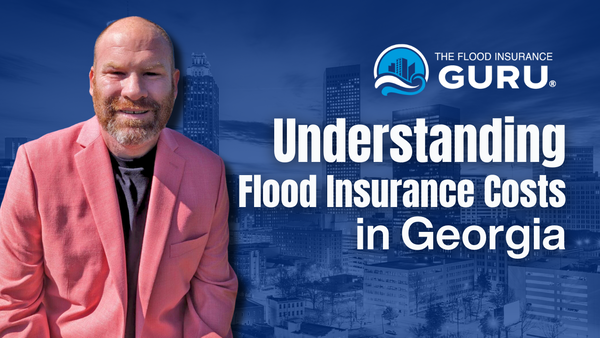Understanding Flood Insurance Costs in Georgia
As homeowners in Georgia, navigating the landscape of flood insurance can often feel like a complex journey into unfamiliar waters. With the state’s susceptibility to flooding, understanding the intricacies of your insurance policy is more than just a financial consideration; it’s a crucial step in safeguarding your home and peace of mind.
Decoding the nuances of what influences the cost of your flood insurance policy in Georgia is paramount to securing coverage that meets your specific needs without unnecessary financial burden. Now, let’s unwrap the layers of flood insurance costs in our beautiful state. With my guidance, you’ll gain a clearer picture of what to expect and how to potentially lower your premiums.
Keep reading as we chart a course through average rates, influential factors, and options available to Georgia homeowners seeking to protect their most valuable asset – their home.
AVERAGE COST OF FLOOD INSURANCE IN GEORGIA
As I delve into the complexities of flood insurance costs for my neighbors here in Georgia, I’m acutely aware of how advertising doesn’t always paint the full picture of the financial risk we face. Strikingly, these costs aren’t uniform across our state; they can vary widely from city to city and county to county. Understanding these variations is vital, especially for anyone holding a mortgage, as lenders typically require flood insurance in high-risk areas.
Through the National Flood Insurance Program (NFIP), managed by the Federal Emergency Management Agency (FEMA), rates are determined by a myriad of factors, including location and flood zone designation. In the upcoming breakdown, I’ll provide a clearer view of what homeowners like us can expect to pay in major Georgian cities and by county, aiming to navigate through the intricacies of flood insurance premiums in our diverse and beautiful state.

Breakdown by Major Cities
Investigating how much flood insurance costs in some of Georgia’s major cities, I’ve come to find that the premiums intertwine with local history and geography just as intrinsically as the rivers and creeks that contribute to water damage risks around our homes. For instance, a homeowner in Atlanta may face different insurance premiums than someone in Savannah, where the proximity to the coast and the frequency of storms play a significant role in determining home insurance rates.
The intricacies of flood zones and their impact on water damage risk result in a surprising range of insurance costs. Here’s a snapshot of the average annual flood insurance premiums in major Georgian cities:
|
City |
Annual Flood Insurance Premium |
|
Atlanta |
$700 |
|
Savannah |
$675 |
|
Augusta |
$550 |
|
Columbus |
$600 |
|
Macon |
$625 |
Each city’s vulnerabilities to water-related catastrophes, like storm surges or flooding rivers, directly affect the question that’s on every homeowner’s mind: how much is flood insurance in Georgia? The table above displays averages, yet it’s important to remember that individual property evaluations can lead to significant deviations from these figures.
Average Cost of Flood Insurance by County in Georgia
In my professional experience, the county where a property is located significantly affects the cost of flood insurance. For instance, homeowners in counties with extensive river systems may see higher rates, while properties with robust air conditioning systems, which demonstrate a commitment to maintaining the home’s integrity, might benefit from lower premiums. However, the complex tapestry of factors influencing property insurance costs requires a keen understanding of local topographies and flood histories. air conditioning
My clients often ask about the specific variables that drive their flood insurance expenses. Georgia’s diverse geography means there’s a spectrum of risk, wildly affecting the cost of flood insurance by county. One shouldn’t assume that living inland or having a state-of-the-art air conditioning system will completely mitigate these costs, as flash floods and other unpredictable events can escalate premiums regardless of common preventive measures. Understanding flood insurance costs in Savannah GA.

FACTORS THAT AFFECT FLOOD INSURANCE COSTS IN GEORGIA
As we navigate the nuances of flood insurance costs, it’s crucial for Georgia homeowners to grasp the recent paradigm shift in the form of Risk Rating 2.0—emergency management’s contemporary approach to evaluating flood risk. This initiative reshapes how premiums are calculated, no longer solely dependent on whether a home sits in a designated floodplain. Consequently, understanding the specific flood zones and their profound impact on insurance premiums becomes even more pertinent.
Additionally, factors such as the appraised value of one’s home directly correlate with the cost of securing adequate coverage. Homeowners should thoroughly weigh the implications of their policy’s deductible and limits, much like the careful considerations one would give to a credit card or loan terms.
It’s the amalgamation of these crucial aspects that dictate the annual expenditure devoted to safeguarding one’s abode against the unpredictability of floods.
Risk Rating 2.0
Risk Rating 2.0 represents a significant shift in the way insurers like Liberty Mutual and other general insurance providers assess properties for flood coverage. This modernized approach takes a granular look at individual properties, going beyond the simple binary of flood zone designations to include factors such as the potential cost to rebuild and the specific risk of natural disasters that could affect personal property. 10 things you need to know about nfip risk rating 2.0
Under the new Risk Rating 2.0 system, my clients’ premiums are more personalized, and the intricacies of each policy reflect a fairer assessment of the actual risk to their homes. Liability insurance carriers are recalibrating their rates to align with this more accurate representation of flood threat, leading to better-informed coverage decisions that can help homeowners prepare financially for the possibility of a natural disaster. Risk Rating 2.0
Flood Zones and Their Impact on Insurance Premiums
Mapping out the price of flood insurance, it’s evident that flood zones significantly influence premiums. As a casualty insurance practitioner, I’ve seen firsthand how properties with basements in high-risk flood zones incur greater expenses, reflecting the heightened vulnerability to extensive damage from flooding events.
For homeowners seeking information on their potential flood insurance rates, understand that living within different flood zone designations can alter the cost dramatically. If your home is situated in an area with a historical predisposition to flooding, the expense reflected in your policy will likely be a direct consequence of this elevated risk level.
Home Value and Insurance Costs
When assessing the intricacies of flood insurance costs, your home’s value emerges as a central factor, much like how life insurance premiums are partially shaped by personal net worth. Higher home values often translate to higher flood insurance rates, as the potential financial hazard from damage caused by rain or other water-related catastrophes increases with the value of the investment.
Your credit can be as influential on your flood insurance premiums as it is on loan interest rates. Insurers view a strong credit history as an indicator of financial stability, which can sometimes result in more favorable insurance costs. Thus, maintaining good credit can be a critical strategy for managing the expenses associated with insuring high-value homes against flood risks.
|
Home Value |
Estimated Flood Insurance Premium |
|
$200,000 |
$800 |
|
$300,000 |
$1,200 |
|
$400,000 |
$1,600 |
Deductibles and Policy Limits
The choice of deductible, the amount you pay out of pocket before your insurance kicks in, greatly affects the cost of your premiums and can alter your financial responsibility in the event of property damage. Selecting a higher deductible might lower your monthly payments, yet it’s a balance between immediate savings and potential risk in areas like a special flood hazard area, where property damage is more likely.
When speaking with a company about coverage options, I often remind clients that the policy limits set the ceiling for how much will be paid out for claims. It’s crucial to ensure that your policy covers potential repair or replacement costs, which could range from structural damages to plumbing, and is in line with the flood insurance rate map‘s indication of your home’s flood risk. Establishing the right coverage limits can prevent substantial financial hardship post-disaster.
COMPARING NFIP VS. PRIVATE FLOOD INSURANCE COSTS IN GEORGIA
As we evaluate the landscape of flood insurance in Georgia, homeowners must navigate the differences between National Flood Insurance Program (NFIP) policies and options available through private insurers.
The underwriting process for each can result in varying home insurance rates, influenced by factors like flood mitigation efforts and historical flooding patterns. While NFIP policies offer a standardization cushioning against financial liability, the private market tailors coverage to individual needs, often incorporating newer models and technology in their risk assessments.
As I guide my clients, the goal remains clear: to elucidate the pros and cons of both choices, enabling informed decisions that harmonize cost-efficiency with robust protection.
In the forthcoming analysis, I’ll compare costs and weigh the significance of each policy type, assisting homeowners in choosing the insurance path that aligns with their specific circumstances.
NFIP Flood Insurance Policies
The National Flood Insurance Program (NFIP) presents a set of standardized policies that help homeowners in Georgia manage their exposure to flood risk. These policies, dictated by FEMA’s guidelines, incorporate the updated risk rating methodology aimed at delivering premiums commensurate with the actual risk to individual properties, providing a more equitable landscape for flood insurance costs.
On the other hand, those looking for commercial flood insurance often find that the NFIP offers a balance between comprehensive coverage and cost-effectiveness. Securing an NFIP flood insurance quote can be an enlightening first step for homeowners and auto insurance policyholders alike, offering clarity on the extent of protection available for their cherished homes and vehicles:
|
Coverage Type |
Annual Premium |
Deductible |
|
Homeowners |
$950 |
$1,250 |
|
Auto |
$120 |
$500 |
|
Commercial |
$3,500 |
$5,000 |
Private Flood Insurance Policies
When considering private flood insurance policies, homeowners in Georgia often encounter a more customized experience offered by an insurance company. Unlike NFIP, private insurers take a bespoke approach to coverage, which can include additional protections against the financial impact of storms not typically covered by renters insurance or standard homeowners insurance policies.
In my interactions with Georgia residents, I’ve noted that private policies can offer advantageous options for mitigation efforts, which may lead to reduced premiums over time. Although these insurance products tend to be more responsive to market changes, they can deliver a level of flexibility and innovation that complements traditional homeowners insurance, addressing unique needs that arise in our storm-prone region.

Cost Comparison and Choosing the Right Option
As I sift through the various insurance policies available in Georgia, I make it a point to emphasize to my clients the significance of considering every aspect of their homes, from its elevation to the value of their furniture and clothing. Matching these particulars with the right policy, whether it’s through NFIP’s established framework or the tailor-made offerings from private insurers, is essential for ensuring adequate flood coverage that addresses their unique needs.
Moreover, the dynamic landscape of reinsurance impacts the intricacies of premiums for private policies, often enabling these firms to offer competitive rates. It’s paramount for homeowners to weigh the difference carefully: NFIP policies may provide a sense of standardization, but private flood insurance can potentially offer more nuanced protections, reliant on the detailed assessment of their property’s risk factors:
|
Type of Coverage |
NFIP Annual Premium |
Private Insurer Annual Premium |
|
Standard Home Coverage |
$950 |
$900 |
|
Enhanced Home Coverage |
Not Available |
$1,100 |
|
Additional Living Expenses |
Not Available |
$250 |
TIPS FOR REDUCING YOUR FLOOD INSURANCE PREMIUM
Beyond simply understanding the nuances of flood insurance rates in Georgia, there’s a proactive side to managing these costs that often goes overlooked. By centering our efforts on practical measures such as improving your home’s flood resistance, you can potentially reduce the financial impact on your personal finance. Data from past floods can inform us about the effectiveness of certain home adjustments.
Elevations certificates can also play a significant role; these documents can often lead to significant savings on insurance. Regularly reviewing and adjusting your coverage ensures that you’re not paying for more than what you need, all the while keeping an eye on the exact terms of service of your policy to avoid any unwelcome surprises.
Taking these steps won’t just serve to safeguard your property from injury due to flooding—they’re strategic moves to achieve better financial health in an area of personal finance that can often feel overwhelming.
Improving Your Home’s Flood Resistance
One common faq I encounter from clients concerns practical steps to strengthen their homes against the risk of flooding. I’ve advised many residents in Washington, ensuring their living space is less vulnerable to potential damages. Elevating essential utilities such as electronics can safeguard against the expensive aftermath of water incursion, minimally requiring only knowledge of local zoning requirements and some strategic planning. flood risk
In my conversations with homeowners from Alabama to Georgia, the idea of installing barriers or floodgates has frequently come to light. Such measures can provide an effective line of defense, reducing the likelihood of extensive water damage and, subsequently, leading to lowered insurance premiums. It’s a clear instance where a relatively modest investment in your property can yield substantial financial benefits over time.

Exploring Elevation Certificates
As a flood insurance consultant, I often guide clients through the process of obtaining elevation certificates, which can be a gamechanger for homeowners from Atlanta to Virginia looking to conserve cash on their flood insurance premiums. Elevation certificates document your home’s elevation relative to floodplains, and possessing this certificate can lead to discounts on premiums, especially in areas like Tennessee where elevation may vary significantly.
In my experience, not enough homeowners in Georgia take advantage of elevation certificates, often missing out on potential savings due to lack of awareness. I’ve seen clients deterred by potential theft of time and money, but I always stress that this is one area where upfront diligence pays off in long-term savings. This is especially true in Atlanta, where diverse landscapes and flood risk profiles make having an elevation certificate a prudent financial decision.
Reviewing and Adjusting Your Coverage
Yearly assessment and fine-tuning of your policy is not just an option; it’s a financially prudent practice every customer should embrace. By regularly evaluating coverage against current needs, you can ensure your policy remains cost-effective and aligned with the community rating, potentially leading to lower premiums.
For instance, if I’ve sold a vehicle or moved out of a high-risk flood area—perhaps trading in Georgia’s coastline for California’s varied terrain—it’s critical to update my policy to reflect these changes. The accuracy of this information can profoundly influence the cost of premiums and affords me the opportunity to renegotiate terms to better suit my situation:
|
Policy Change |
Impact on Premium |
|
Sold Vehicle |
Decrease |
|
Moved to Lower Risk Area |
Decrease |
|
Updated to Reflect Community Rating |
Adjusted Rate |
HOW TO GET FLOOD INSURANCE IN GEORGIA
For Georgian homeowners and commercial property owners alike, protecting your assets from coastal flooding begins with securing the right insurance. Whether you’re nestled near the swaying savannahs or perched in the urban sprawl of Atlanta, understanding the steps to purchase NFIP Insurance is a critical first move. Similarly important is exploring the diverse landscape of private flood insurance providers, each with distinct advantages and policy options.
As you prepare to make your payment, consider that the process isn’t as straightforward as shopping for auto insurance in Utah or homeowners coverage in Michigan; meticulous research and a thorough evaluation of potential risks are paramount to ensure the security of your investment.
Steps to Purchase NFIP Insurance
To secure flood insurance through the National Flood Insurance Program (NFIP) in Georgia, the initial step involves entering into a contract with an insurance agent or company that participates in the program. It’s akin to planting a tree; it requires a deliberate choice and the willingness to invest in the future stability of your property.
Following the contractual agreement, the next phase involves a detailed review of your property’s location, notably the county you’re situated in, to assess its flood risk. This step is pivotal in risk management, ensuring that the coverage you opt for adequately aligns with your county’s flood history and potential vulnerabilities. Just as South Carolina has its unique considerations, Georgia’s diverse terrain necessitates a close examination:
|
Step |
Action |
Benefit |
|
Contract with Agent/Company |
Sign up with NFIP-participating entity |
Secures initial access to NFIP offerings |
|
Flood Risk Assessment |
Analyze property location and flood zone designation |
Tailors coverage to specific county-based risk levels |
Finding Private Flood Insurance Providers
Embarking on the pursuit of private flood insurance providers requires research and due diligence, much like meticulously selecting any important service provider. Knowing your property’s specific needs and risks allows you to seek out private insurers that specialize in coverage that aligns with your unique circumstances, leading to potentially more suitable protection than what’s traditionally offered. For those looking deeper into this topic, avoiding mistakes a guide to buying flood insurance can be an invaluable resource.
As a flood insurance consultant, I recommend reaching out to several private insurers to compare rates and coverage options. Each company assesses risk through their proprietary methods, so obtaining multiple quotes ensures you find the most competitive offer catered to your property:
|
Contact Made |
Insurer Queried |
Outcome |
|
Initial Inquiry |
Insurer A |
Received Preliminary Quote |
|
Second Inquiry |
Insurer B |
Quote and Coverage Details Provided |
|
Third Inquiry |
Insurer C |
Needs Additional Property Information |
IS FLOOD INSURANCE MANDATORY IN GEORGIA?
As a Flood Insurance Guru, one question that often arises among homeowners here in Georgia is whether purchasing flood insurance is a requirement by law. While statewide mandates don’t exist, two major factors significantly influence the need for flood insurance: whether your home is situated in a high-risk flood zone and if your mortgage lender stipulates that such coverage is necessary. Your location’s designation on flood maps determines the likelihood of encountering flooding events, and in turn, whether insurance becomes imperative to have.
On the other side, mortgage lenders, concerned about protecting their investment, usually insist on adequate flood insurance for properties within these risky areas. So, while Georgia law may not oblige you to buy flood insurance, these elements effectively decide its necessity for safeguarding your home and financial well-being.

Determining if You Live in a High-Risk Zone
Assessing whether your home falls within a high-risk flood zone starts with a simple yet pivotal step: consulting FEMA’s Flood Map Service Center. This tool provides a detailed view of your region, highlighting areas prone to flooding, and designates them into different zones based on risk levels.
Once you’ve pinpointed your property on the flood map, understanding the various zone classifications directly affects your insurance obligations. Zone designations starting with ‘A’ or ‘V’ indicate higher risks, often triggering mandatory flood insurance requirements by mortgage lenders:
|
Zone Designation |
Risk Level |
Insurance Implication |
|
Zones A, AE, AH, AO |
Moderate to High Risk |
Potentially Mandatory |
|
Zones V, VE |
High Risk (Coastal Areas) |
Usually Mandatory |
|
Zones B, C, X |
Moderate to Low Risk |
Typically Optional |
|
Zone D |
Undetermined Risk |
Varies |
Lender Requirements for Flood Insurance
Engaging with lenders across Georgia has revealed a consistent theme: in high-risk flood areas, these financial institutions require homeowners to carry flood insurance as a stipulation of their mortgage agreement. The security of the property—and by extension, their loan collateral—is paramount, compelling the imposition of such insurance mandates.
My straightforward advice to prospective homeowners seeking loans is to review their mortgage contract closely. Here, they will often find distinct clauses pertaining to flood insurance, detailing the necessary coverage scope to meet the lender’s conditions for safeguarding the asset against flood-related damages. For more detailed information, you might want to explore understanding flood zone A and FEMA flood maps.
GEORGIA FLOOD INSURANCE COMPANIES
My clients often ask about the top companies offering flood insurance in Georgia, and knowing where to start can be half the battle. From well-known industry giants to specialized local firms, a variety of providers offer policies designed to shield our homes from the perils of flooding. Critical to finding the right fit is comparing quotes and evaluating the services each company provides. My role is to simplify this process, helping homeowners discern which policies offer the best protection for their specific circumstances at the most reasonable rates.
Through careful analysis, we can identify a provider that not only meets but exceeds expectations, ensuring peace of mind when it comes to safeguarding one of our most valuable assets.

Top Companies Offering Flood Insurance
As someone deeply involved in the flood insurance industry, I’m attuned to the reputations and capabilities of various companies serving Georgian homeowners. Firms like Allstate and State Farm stand out for their comprehensive flood insurance offerings, which include both NFIP-backed and private policies designed to meet diverse homeowner needs, all backed by robust support systems and extensive experience in the insurance landscape.
During my dealings with clients, I’ve also observed that smaller, regional insurers such as Georgia Farm Bureau offer tailored solutions with a personal touch, understanding the local nuances that can affect flood insurance coverage. These companies provide competitive rates and detailed assessments, often delivering an intimate customer service experience that can be incredibly reassuring in the complexities of managing flood risk.
Comparing Quotes and Services
Seeking out flood insurance quotes and evaluating services offer a critical avenue for homeowners to secure optimal coverage at competitive rates. It demands a detailed analysis of policy features, deductibles, and coverage limits, mirroring the caution and attention one would apply to any significant financial decision.
Establishing a comprehensive comparison across different providers enables informed decisions, steering clear of the pitfalls of overpaying or underinsuring. Collaborating closely with an insurance advisor streamlines this process, transforming what might seem like an overwhelming task into a manageable and targeted strategy:
|
Provider |
Policy Feature |
Annual Premium |
Deductible |
|
Company A |
Standard Coverage |
$850 |
$1,000 |
|
Company B |
Enhanced Loss Prevention |
$1,200 |
$1,500 |
|
Company C |
Comprehensive Suite |
$1,500 |
$2,000 |
FREQUENTLY ASKED QUESTIONS
What is the average cost of flood insurance in Georgia?
The average cost of flood insurance in Georgia runs about $700 annually, though rates may vary based on location and coverage specifics.
What factors determine the price of flood insurance in Georgia?
Flood insurance rates in Georgia are affected by several factors, including the property’s flood zone designation, the value and structure of the home, its elevation, and the coverage amount chosen by the homeowner.
Should I choose NFIP or private flood insurance in Georgia?
When considering flood insurance in Georgia, NFIP offers government-backed coverage and set guidelines, whereas private insurance provides flexibility in coverage and potentially quicker claims resolution. Your choice should reflect your individual needs and risk assessment.
How can I lower my flood insurance premium in Georgia?
To lower your Georgia flood insurance premium, elevate your home, install flood openings, and compare policies for competitive rates. Each step can lead to substantial savings on your annual premium.
Do homeowners in Georgia have to purchase flood insurance?
In Georgia, homeowners aren’t mandated by state law to carry flood insurance; however, mortgage lenders may require it if the property is in a high-risk flood zone.

CONCLUSION
Understanding flood insurance costs in Georgia is fundamental for homeowners to financially protect their properties against unpredictable flooding events.
By recognizing the factors that influence premium rates, such as location, home value, and flood zone designations, homeowners can make informed decisions on appropriate coverage. Comparing policies from the NFIP and private insurers helps to find the best option tailored to specific needs and risks.
Lastly, proactive measures like obtaining elevation certificates and regularly reviewing coverage can lead to substantial savings on flood insurance premiums.
Information contained on this page is provided by an independent third-party content provider. This website make no warranties or representations in connection therewith. If you are affiliated with this page and would like it removed please contact editor @producerpress.com















